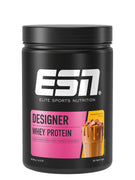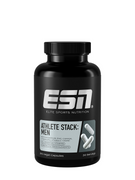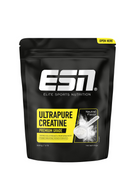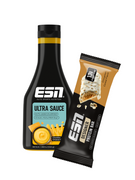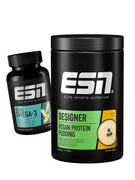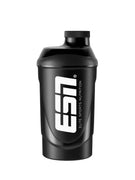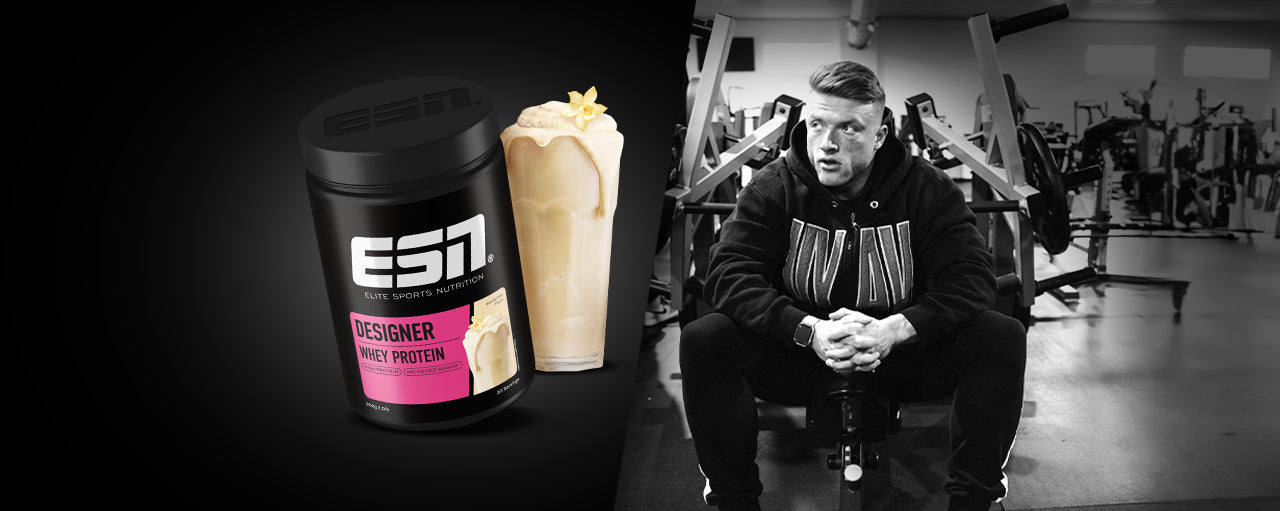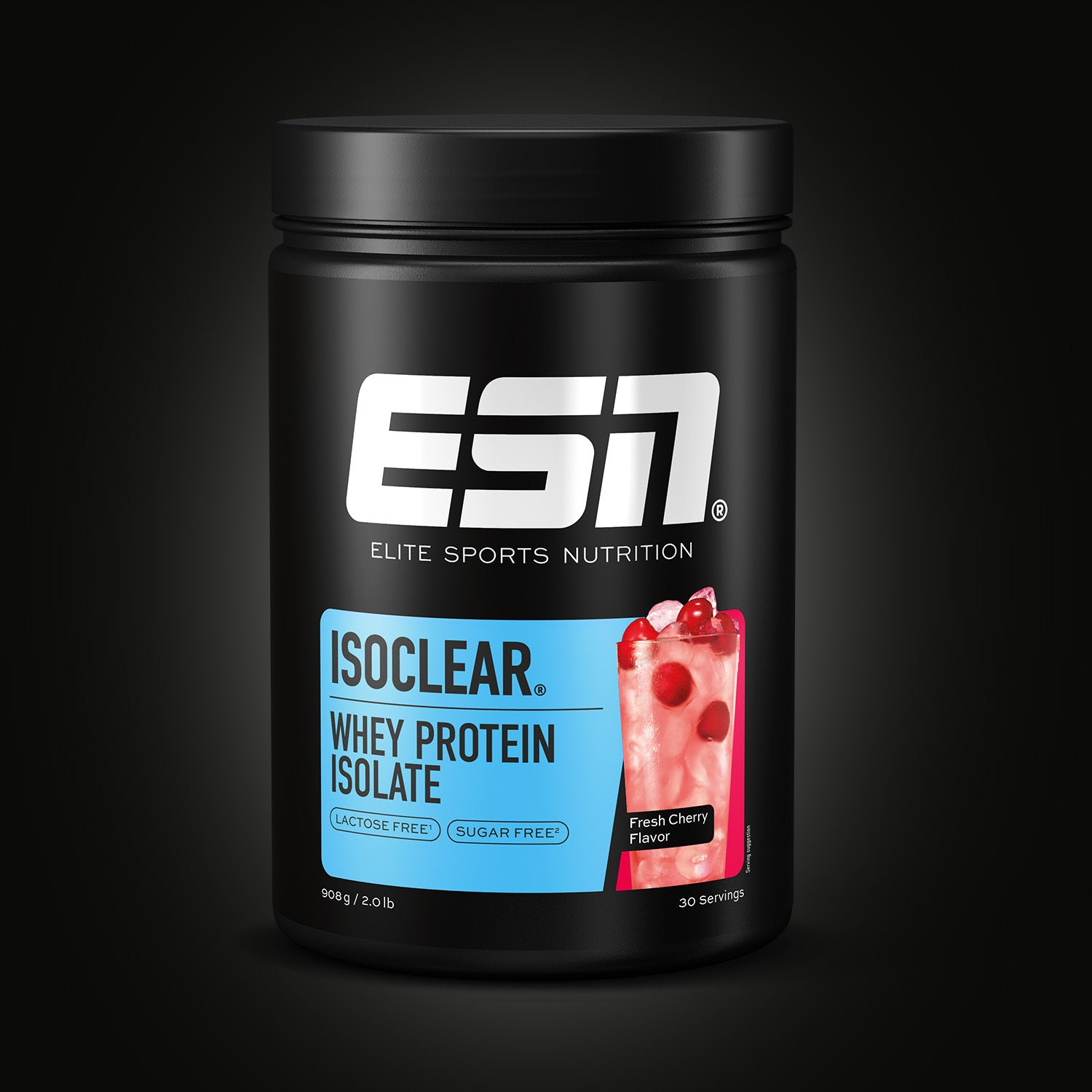Das Wichtigste in Kürze
Der ideale Zeitpunkt für die Proteinzufuhr: Wann du Proteine zu dir nimmst, spielt für den Muskelaufbau weniger eine Rolle. Wichtiger ist, dass du genug Protein zu dir nimmst.
Wie viel Eiweiß brauchst du für den Muskelaufbau? Wir empfehlen dir täglich 2 g Protein pro kg Körpergewicht zu dir zu nehmen.
Warum überhaupt Protein-Shakes nutzen? Protein-Shakes können eine sinnvolle Ergänzung zu der täglichen Ernährung sein, denn sie bieten dir eine praktische und effiziente Möglichkeit, den täglichen Eiweißbedarf einfacher zu decken, besonders nach dem Training oder in stressigen Phasen, in denen eine ausgewogene Ernährung schwer umzusetzen ist.
Der ideale Zeitpunkt für die Proteinzufuhr
Protein, auch Eiweiß genannt, ist wichtig für den Körper, spielt aber insbesondere für den Muskelaufbau eine große Rolle.1 Da ist es nur verständlich, dass sich viele Athletes fragen, wann sie ihr Protein denn nun zu sich nehmen: vor dem Training, lieber danach oder sogar währenddessen? Wir machen es kurz: Wann immer du willst!
Schauen wir uns trotzdem genauer an, was potenziell für Protein-Shakes vor wie auch nach dem Training spricht, was dagegen und was es mit dem anabolen Fenster auf sich hat.
Ein Eiweiß-Shake vor dem Training – ist das sinnvoll?
Die Vorteile: Ein Protein-Shake vor dem Training kann sinnvoll sein, wenn man eine schnelle Proteinquelle benötigt, um das Training zu supporten – vor allem bei langen oder intensiven Einheiten. Ein weiterer potenzieller Vorteil ist, dass essentielle Aminosäuren in den Muskeln während des Trainings zur Verfügung stehen. Das kann den Aufbau und die Reparatur der Muskeln unterstützen.1 Auch wenn du länger trainierst oder auf nüchternen Magen trainierst, kann ein Protein-Shake vor dem Workout dabei unterstützen, den Muskelabbau zu vermeiden.1 Dies ist besonders wichtig, wenn du dich in einem Kaloriendefizit befindest.
Die Nachteile: Nicht jeder Körper verträgt einen Protein-Shake kurz vor dem Training. Es kann zu Völlegefühl oder Magenproblemen kommen, was die Leistungsfähigkeit beeinträchtigen könnte. Einen Protein-Shake alleine als Energiequelle zu nutzen, ergibt wenig Sinn, denn der Körper verwendet während des Trainings primär Kohlenhydrate und Fette als Energiequellen.2 Protein ist also weniger effektiv, wenn es darum geht, unmittelbare Energie bereitzustellen. Ein Shake vor dem Training könnte daher unnötig sein, wenn ausreichend Kohlenhydrate zur Verfügung stehen.
Unser Tipp: Wenn du vor dem Training einen Protein-Shake trinken möchtest, empfehlen wir dir unseren erfrischend klaren Protein-Drink Isoclear. Für mehr Power im Training solltest du nicht nur auf Protein, sondern auf die Kombi von Proteinen und Kohlenhydraten setzen: Proteine sind eher langfristig für die Muskelreparatur und -aufbau wichtig, während Kohlenhydrate schnell in Energie umgewandelt werden.1,2 Wir empfehlen dir unseren Rice Pudding oder die Instant Oats in Kombi mit einem Proteinpulver wie etwa dem Designer Whey oder Designer Vegan Protein.
Ein Protein-Shake nach dem Training – das Wundermittel für den Muskelaufbau?
Vorteile: Direkt nach dem Training befinden sich die Muskeln in einem aufnahmebereiten Zustand, der oft als „anaboles Fenster“ bezeichnet wird. In dieser Phase benötigt der Körper Proteine, um beschädigte Muskelfasern zu reparieren und zu stärken.1 Ein Protein-Shake nach dem Training stellt die benötigten Nährstoffe schnell zur Verfügung. Auch sind die Aminosäurenspeicher nach dem Training oft erschöpft. Ein Protein-Shake hilft, diese schnell aufzufüllen und dem Muskelabbau entgegenzuwirken.1 Ein weiterer wichtiger Punkt ist, dass es nach dem Training oft schwer sein kann, direkt eine ausgewogene Mahlzeit zu sich zu nehmen. Ein Protein-Shake ist schnell und einfach zubereitet, was ihn zu einer praktischen Alternative macht.
Nachteile: Wenn du bereits nach dem Training eine ausgewogene Mahlzeit mit ausreichend Protein zu dir nimmst, kann ein zusätzlicher Shake unnötig sein. In solchen Fällen ist der Proteinbedarf oft bereits gedeckt.
Weiterhin verlassen sich einige Athletes zu sehr auf Protein-Shakes und vernachlässigen eine ausgewogene Ernährung mit natürlichen Proteinquellen. Langfristig sollte der Großteil des Proteins aus vollwertigen Lebensmitteln kommen, da diese auch andere wichtige Nährstoffe enthalten. Protein-Shakes sollten also als Ergänzung zu einer normalen, ausgewogenen Ernährung gesehen werden.
Unser Tipp: Nach dem Training solltest du deinen Körper mit allem versorgen, was er für optimale Regeneration braucht. Wir empfehlen dir, ein Proteinpulver wie bspw. unser Designer Whey oder auch unseren Post-Workout-Drink Recharge, mit Proteinen einer Kohlenhydrat-Matrix und anderen wichtigen Nährstoffen.
Das anabole Fenster & der Muskelaufbau
Wir haben es weiter oben schon angeteasert: das anabole Fenster. Darunter versteht man den Zeitraum nach dem Workout, in dem der Körper und die Muskeln besonders aufnahmefähig sind und maximal von der Zufuhr von Proteinen und wichtigen Aminosäuren profitieren. Lange ist man davon ausgegangen, dass das anabole Fenster recht klein ist und man innerhalb der ersten 30 min nach dem Workout mit der Proteinzufuhr beginnen muss, um überhaupt Muskeln aufzubauen. Neuere wissenschaftliche Untersuchungen haben jedoch gezeigt, dass das anabole Fenster deutlich größer ist als angenommen: Die beiden Forscher Alan Albert Aragon und Brad Schoenfeld haben herausgefunden, dass es ausreichend ist, innerhalb von 2 bis 3 Stunden nach dem Workout hochwertige Proteine zu sich zu nehmen bspw. als eiweißreiche Mahlzeit oder als Shake.3 Dabei solltest du jedoch auch darauf achten, ein paar Kohlenhydrate und Fette einzubauen, denn auch die brauchen deine Muskeln zur Regeneration nach dem Training.2
Du suchst noch nach dem perfekten Proteinpulver für deine Bedürfnisse? Dann haben wir genau das Richtige für dich:

Die aktuelle Studienlage
Und was sagt die Wissenschaft dazu? Nachdem es lange keine wissenschaftlich begründete Antwort darauf gab, ob man Protein-Shakes besser vor oder nach dem Sport trinken sollte, gingen Brad Schoenfeld, Alan Albert Aragon, James W. Krieger und weitere im Jahr 2016 genau dieser Frage wissenschaftlich auf den Grund. In ihrer Studie teilten sie dazu 21 Männer in 2 Gruppen auf, die jeweils einen Protein-Shake mit 25 g Protein bekamen. Eine Gruppe trank den Eiweiß-Shake vor dem Training, die andere danach. Alle Probanden trainierten außerdem nach dem gleichen Trainingsplan an gleich vielen Tagen.
Das Ergebnis: Die Wissenschaftler:innen konnten keine signifikanten Unterschiede zwischen den beiden Gruppen beobachten, was sich auch mit dem Ergebnis einer ausführlichen Meta-Analyse verschiedener Studien aus dem Jahr 2013 deckt.4 Sie kamen vielmehr zu dem Schluss, dass es für den Muskelaufbau weniger eine Rolle spielt, wann man Proteine zu sich nimmt, sondern eher, dass man überhaupt Eiweiß zu sich nimmt.1 Entscheidend ist nämlich, dass der tägliche Proteinbedarf ausreichend gedeckt wird.
Wie viel Eiweiß brauchst du für den Muskelaufbau?
Neben dem passenden Zeitpunkt ist es vor allem wichtig, wie viel Protein überhaupt für den Muskelaufbau benötigt wird.1 Proteine gehören zu den wichtigsten Makronährstoffen für den Körper und tragen zur Zunahme und zum Erhalt von Muskelmasse bei.1 Die Deutsche Gesellschaft für Ernährung (DGE) empfiehlt für gesunde Erwachsene 0,8 g Eiweiß pro kg Körpergewicht, um einen Eiweißmangel zu vermeiden.5 Doch einige Experts wie bspw. Dr. Peter Attia behaupten, dass die meisten Menschen mindestens das Doppelte benötigen – also 1,6 g pro kg, um den Körper optimal mit Proteinen zu versorgen. Für aktive Menschen, die Muskeln aufbauen wollen, empfiehlt Attia sogar 2,2 g pro kg.6
Wir schließen uns dem an und empfehlen dir, täglich 2 g Protein pro kg Körpergewicht zu dir zu nehmen – ganz unabhängig von deinem Ziel oder Aktivitätslevel.
Du willst die ideale Makroverteilung für dein persönliches Ziel wissen? Mit unserem Kalorienrechner kannst du deinen Bedarf easy, schnell und passend zu deinem persönlichen Ziel ermitteln.
Warum überhaupt Protein-Shakes nutzen?
Weil Protein-Shakes eine bequeme und einfach Art sind, den täglichen Proteinbedarf einfacher zu decken. Vorab: Du MUSST keine Protein-Shakes trinken, um Muskeln aufzubauen.
Auch wenn man seinen Proteinbedarf grundsätzlich durch eine bewusste und ausgewogene Ernährung decken kann, können Protein-Shakes für Athletes eine sinnvolle Ergänzung sein. Besonders nach intensiven Trainingseinheiten brauchen die Muskeln schnell verfügbare Nährstoffe, um optimal zu regenerieren und sich aufzubauen. Protein-Shakes bieten hier eine praktische und effektive Lösung: Sie liefern hochwertiges Eiweiß, das der Körper sofort verwerten kann.1
Darüber hinaus sind sie zeitsparend und besonders für Athletes mit einem vollen Terminkalender ideal. Statt aufwändig Mahlzeiten vorzubereiten, hat man mit einem Shake jederzeit eine schnelle Proteinquelle zur Hand. Ein weiterer Vorteil ist die präzise Dosierung: Protein-Shakes ermöglichen es dir, die Proteinzufuhr genau an den individuellen Bedarf und den jeweiligen Trainingsplan anzupassen.1
Anwendungsmöglichkeiten für Proteinpulver
Protein-Shakes stellen nur eine Möglichkeit dar, um Eiweiß in deine Ernährung zu integrieren. Denn gerade Whey Protein kann viel mehr sein als „nur“ ein Shake. So kannst du Whey Protein zum Backen nutzen oder dein Proteinpulver auch zum Frühstück in deinen Quark oder Joghurt einrühren. Du willst dein Protein schon morgens mit dem Kaffee aufnehmen? Auch das geht, z. B. mit Protein Kaffee. Du siehst, Whey Protein in deinen Alltag zu integrieren, ist gar nicht schwierig. Wir empfehlen dir, deine Proteinzufuhr über den Tag zu verteilen, so erreichst du auch easy deinen Proteinbedarf. Ob du für die Protein-Shake-Zubereitung dann lieber den Zeitpunkt vor oder nach dem Sport oder sogar beides wählst, bleibt ganz dir überlassen.
Fazit: Protein-Shake vor der nach dem Training – was ist besser?
Laut aktuellen wissenschaftlichen Studien macht es keinen Unterschied, ob du deinen Protein-Shake vor oder nach dem Training zu dir nimmst.4 Vielmehr solltest du darauf achten, deinen Tagesbedarf an Protein zu decken und so den Muskelaufbau zu unterstützen.1
Deshalb kannst du deinen Protein-Shake einfach dann trinken, wenn es für dich am besten ist. Fühlst du dich mit einem Protein-Shake vor dem Training fit und leistungsfähig, dann scheint die Einnahme vor dem Sport ideal für dich. Bist du eher der Typ, der vor dem Sport lieber nichts isst, dann nimm deinen Shake einfach nach dem Training zu dir.
Achte allerdings darauf, dass du die Einnahme von Eiweiß-Shakes mit deiner sonstigen Proteinzufuhr über die Mahlzeiten abgleichst, um deinen Proteinbedarf optimal zu decken. Außerdem sind nicht nur Proteine entscheidend, wenn du Muskeln aufbauen möchtest, sondern auch Kohlenhydrate und Fette sowie Vitamine und Mineralien sind wichtig für den Körper. Daher ist eine ausgewogene Ernährung mit viel Protein ideal für den Muskelaufbau und das Erreichen deiner Ziele.1
